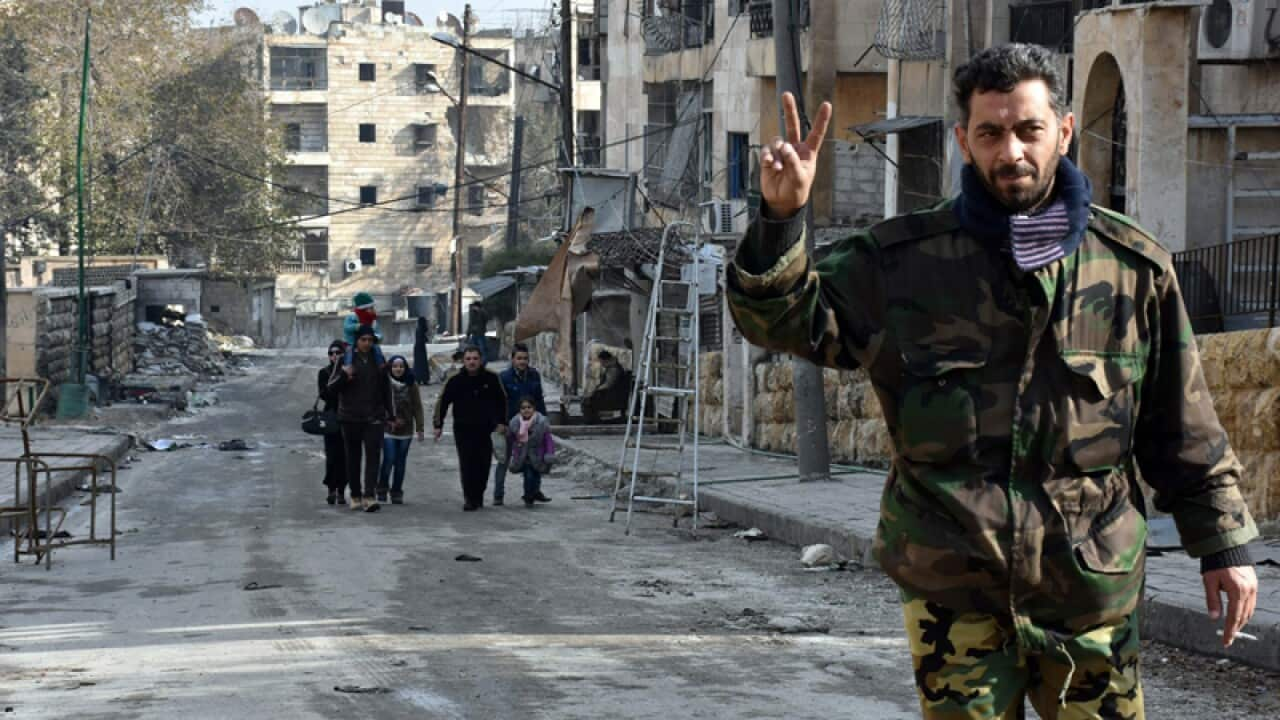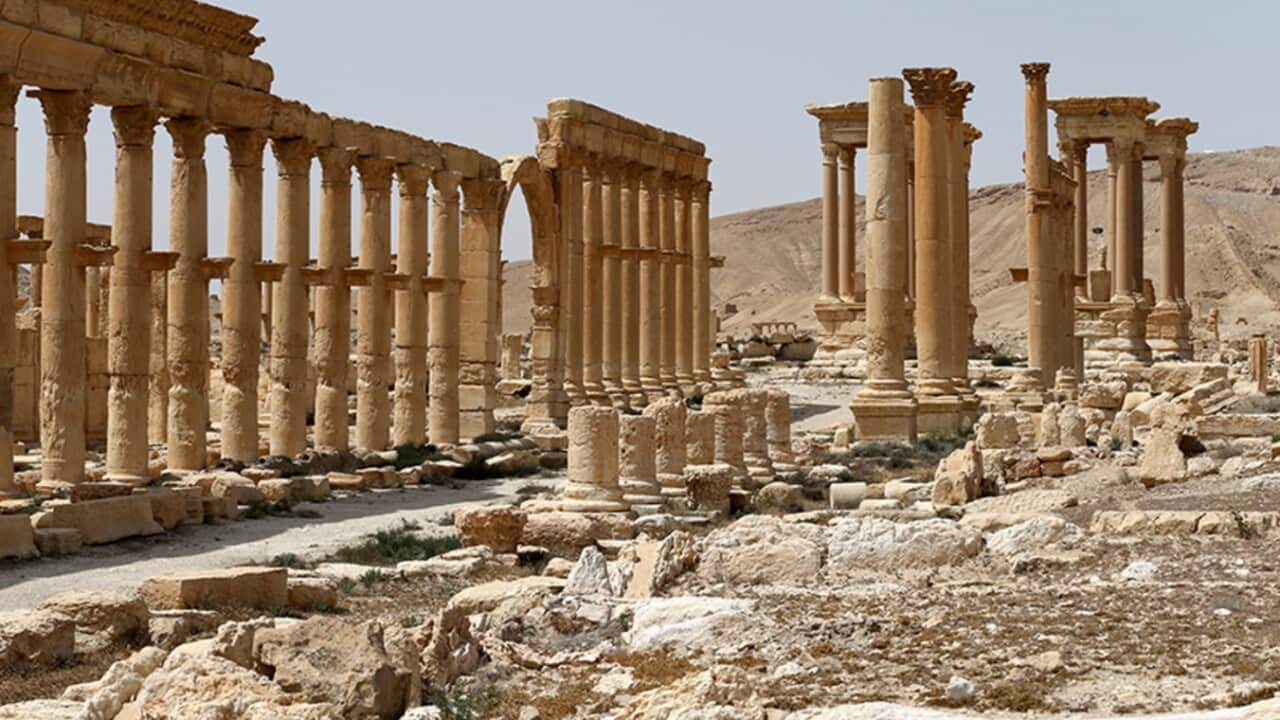The Syrian army has expanded its control over former Islamic State-held villages in northwest Syria, gaining more territory as it pushes back the jihadists from more pockets in Aleppo province.
The army has made steady progress in recent weeks in eastern Aleppo countryside towards the Euphrates River where it now occupies more villages, state-owned Ikhbariyah quoted a military source as saying.
The army's gains follow a push to the south and east of the city of al-Bab, which was captured by Turkey-backed rebels late last month.
Earlier, rebels said they had thwarted a large assault by the Syrian army and Iranian-backed rebels on their remaining strongholds in the western Aleppo countryside near Rashdeen.![]() By taking Islamic State territory south of al-Bab, the army is preventing any possible move by Turkey and the rebel groups it supports to expand southwards. It is also moving closer to regaining control of water supplies for Aleppo.
By taking Islamic State territory south of al-Bab, the army is preventing any possible move by Turkey and the rebel groups it supports to expand southwards. It is also moving closer to regaining control of water supplies for Aleppo.
Islamic State's holdings in northwest Syria have been whittled away over recent months by successive advances by three different, rival forces: Syrian Kurdish groups backed by the United States, the Turkey-backed rebels, and the army.
Islamic State's loss of al-Bab after weeks of bitter street fighting marks the group's effective departure from northwest Syria, once one of its most fearsome strongholds, and an area of importance because of its location on the Turkish border.
Steady advances since 2015 by the Syrian Democratic Forces -the Kurdish-led alliance of US-led armed groups - had already pushed Islamic State from much of the frontier by the middle of last year and have since then threatened its stronghold in Raqqa.
Turkey's entry into Syria's civil war via the Euphrates Shield campaign in support of rebel groups fighting under the banner of the Free Syrian Army was intended both to push Islamic State from the border and to stop Kurdish expansion there.
Tens of thousands flee clashes between Syria army and IS
Tens of thousands of Syrian civilians have fled ferocious fighting between Russian-backed regime forces and Islamic State group jihadists over the past week in the country's ravaged north.
Supported by Russian air power and artillery, Syrian government forces have waged a fierce offensive against IS, seizing around 90 villages since mid-January.
They took 15 on Saturday alone, a military source told state news agency SANA, "expanding our control in northeast parts of Aleppo province".
The Syrian Observatory for Human Rights said the advance took government forces to around 14 kilometres (9 miles) from IS-held Khafsah, the main station pumping water into Aleppo.
READ THESE STORIES TOO

Peace talks produce 'clear agenda' for war-scarred Syria
Residents of Syria's second city have been without mains water for 47 days after the jihadists cut the supply.
The fighting over the past week has sparked an exodus of "more than 30,000 civilians, most of them women and children", Observatory head Rami Abdel Rahman said Saturday.
Most of the displaced went to areas around Manbij, held by the US-backed Syrian Democratic Forces (SDF), an alliance of Kurdish and Arab fighters also fighting IS.
An AFP correspondent in Manbij saw dozens of families speeding towards the relative safety of the town on motorcycles and in small buses and cars.
Many looked exhausted as they lined up at a checkpoint manned by the Manbij Military Council, the SDF unit that controls the town, to be searched and get permission to enter.
'Difficult circumstances'
Ibrahim al-Quftan, co-chair of Manbij's civil administration, told AFP that as many as 40,000 displaced had arrived in recent days.
"The numbers of displaced people here are still rising because of the clashes between the Syrian regime and Daesh (IS)," Quftan said.
"These people are suffering very difficult circumstances."
Manbij already hosts "tens of thousands of displaced people that fled previous clashes in the area", Abdel Rahman said.
"This will make it difficult (for local authorities) to welcome a new wave of displaced people, given their inability to tend to their pressing needs."
Since war broke out in Syria in March 2011, more than half of its pre-war population has been forced to flee their homes.
The northern province of Aleppo hosts tens of thousands of displaced Syrians, many in camps near the Turkish border.
Rebel backer Ankara sent its own troops into Syria in August to fight both IS and Kurdish units in operation "Euphrates Shield".
Turkey considers the Kurdish People's Protection Units (YPG), which makes up most of the SDF, a "terrorist" group because of its ties to outlawed Kurdish militia in Turkey.
On February 23, the Turkish-backed rebels of Euphrates Shield captured the town of Al-Bab, which was IS's last bastion in Aleppo province.
They have since set their sights on Manbij, with Turkish Foreign Minister Mevlut Cavusoglu this week threatening to bomb YPG fighters unless they leave the town.
The Observatory Saturday reported escalating violence and shelling between Euphrates Shield rebels and the SDF.
'Rational, balanced agenda'
More than 310,000 people have been killed since Syria's conflict erupted with protests against President Bashar al-Assad's rule, but international efforts at stemming the violence have so far failed.
Another round of UN-brokered peace talks ended Friday in Geneva, with envoy Staffan de Mistura hoping to convene another session later this month that would include the issue of counter-terrorism.
Chief regime negotiator Bashar al-Jaafari said Saturday the new inclusion indicated the government had successfully "imposed a rational, balanced agenda" on the talks.
"The main topic we focused on more than anything else and which 80 percent of our discussions were about, was combatting terrorism," said Jaafari, who also represents Syria at the United Nations.
Damascus and its ally Moscow had both insisted that "terrorism" be added to the three other focuses of the negotiations: governance, elections, and a constitution.
Russia began its air war in support of Assad's forces in September 2015, and its help was instrumental in recapturing the ancient city of Palmyra from IS Thursday.
Syrian and Russian warplanes bombed jihadist positions near the city Saturday, the Observatory said, as regime forces finished clearing mines at Palmyra airport.
The monitor said 11 civilians were killed Saturday in likely Russian raids on the IS-held village of Oqayrabat northwest of Palmyra.
The US-led coalition fighting IS in Syria and Iraq said Saturday its air strikes killed 21 civilians in both countries in recent months.
It said the deaths bring to at least 220 the number of civilians unintentionally killed in US-led air raids since 2014, although critics say the real number is higher.










